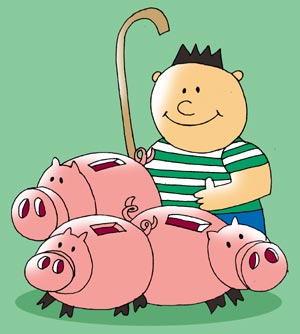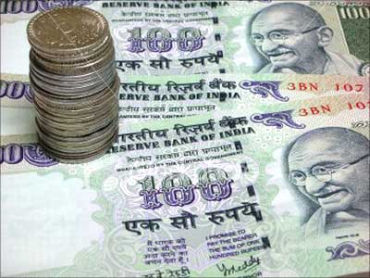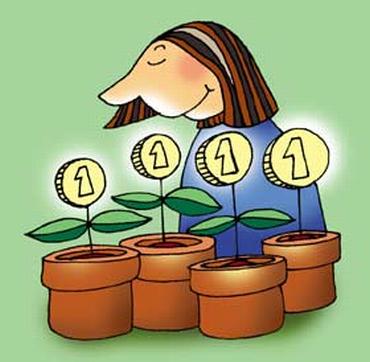 | « Back to article | Print this article |
What and how to teach teens about money?
An Assumption on behalf of the reader: we all know that children need to know the ways of money and it should not be left to destiny or to be learnt by trial and error later on in life.
"What and how to teach your children about money" - Winston Churchill's famously quoted - "I love to learn, but can't say the same thing about being taught."
With children and more so with teenagers it is never easy to "teach", they simply don't want to be taught.
But they should just know. They should know about money.
Click NEXT to read more...
What and how to teach teens about money?
i) Money is a scarce resource and has to be used judiciously
ii) Money has to be earned and doesn't come free
iii) How much you want and how much you have will not always match
iv) Money is really not everything. It is important but not the only important thing in life
You've to get them to learn, by themselves in an easy and fun way, so they own it up, take pride and practice.
And with something like money, which can be a bit tricky, sensitive and sometimes dangerous how do you do this effectively without sounding preachy?
Click NEXT to read more...
What and how to teach teens about money?
Now, don't jump off your seat. Read on...
Children who are 10 years of age are ready for an allowance plan.
Regular (monthly/fortnightly/weekly) allowance money can be given to them that they may use to handle some of their expenditure.
How much money will depend on what all expenses they will handle.
For example: One could start with some basic expenses like say, snacks after school.
The child may want to buy a drink or grab a quick snack from the canteen during or after school.
Click NEXT to read more...
What and how to teach teens about money?
Let's say he spends Rs. 20.00 on the daily snack.
For five days in a week he would spend Rs. 100.00.
So every Monday you could give him Rs.120.00 (20 per cent extra for the child to use his discretion on what to do).
Now, it is simple, instead of giving him Rs. 20.00 everyday or whatever he asks for now and then, you are giving him Rs. 120.00 every week to manage his snack expenses.
If, he tends to spend more on the snack because he has more in his pocket, well, he will learn that money is a scarce resource when you say "Sorry, this week's quota over" if he wants a replenishment middle of the week.
Click NEXT to read more...
What and how to teach teens about money?
The allowance could be linked to some chores in the house. All basic work, like putting away her books and keeping her room clean are to be done anyway and cannot be linked to allowances.
But some work which generally children are not expected to do - like clean the insides of the car once a week/clear the table after dinner and put away washed vessels/soap and clean furniture once a fortnight can be linked to allowances.
You will have to insist that the work be completed 100 per cent to be eligible for allowance.
Shoddy work should not be condoned.
Click NEXT to read more...
What and how to teach teens about money?
But tread the line carefully so as to not permit the child demand money for small helps - like you ask your child to make you a cup of tea after a tiring day, she shouldn't be asking for money to do so.
Encourage the child to put aside money as savings for planned larger expenses like if her friend's birthday is round the corner and she wants to buy a gift, she can put away part of her allowance starting 2-3 months in advance to cover up the extra expenditure.
Click NEXT to read more...
What and how to teach teens about money?
The three box idea is a good one too. Keep three transparent boxes and name them 'spending', 'saving' and 'sharing'.
The allowance once received is split between these three boxes, say Rs. 100 for spending, Rs. 10 for saving and Rs. 10 for sharing.
The saving box is to be used for planned expenses and the sharing box can be opened and the contents donated to a nearby orphanage or animal care centre - whatever cause your child is passionate about.
Click NEXT to read more...
What and how to teach teens about money?
Tell the child what not to do with the money so earned. Like he cannot use it to buy anything dangerous or cannot use it to bully or belittle others.
But do not tell the child what to do. He should be permitted to do what he wants within large boundaries.
He can experiment with speculating or lending to others. If it goes wrong he learns from it.
Click NEXT to read more...
What and how to teach teens about money?
Whatever goes right, whatever goes wrong, learning is a continuous process for both you and your child.
Enjoy the journey.
But always remember - "Allowance is not the child's birth right. It is only a tool to learn how to handle money".
With the right rules in place, the right amount of freedom and the right example set by personal behaviour your child will learn lessons on money that would stay for life.
Good luck.
Powered by
BankBazaar.com is an online marketplace where you can instantly get loan rate quotes, compare and apply online for your personal loan, home loan and credit card needs from India's leading banks and NBFCs.
Copyright 2025 www.BankBazaar.com. All rights reserved.








